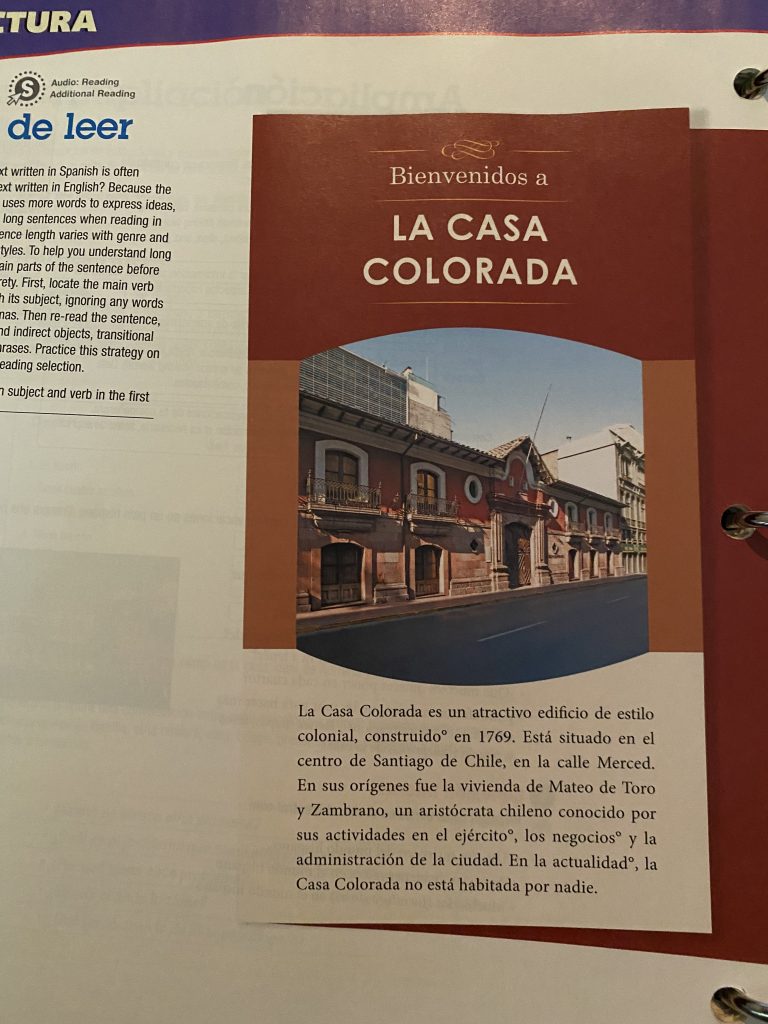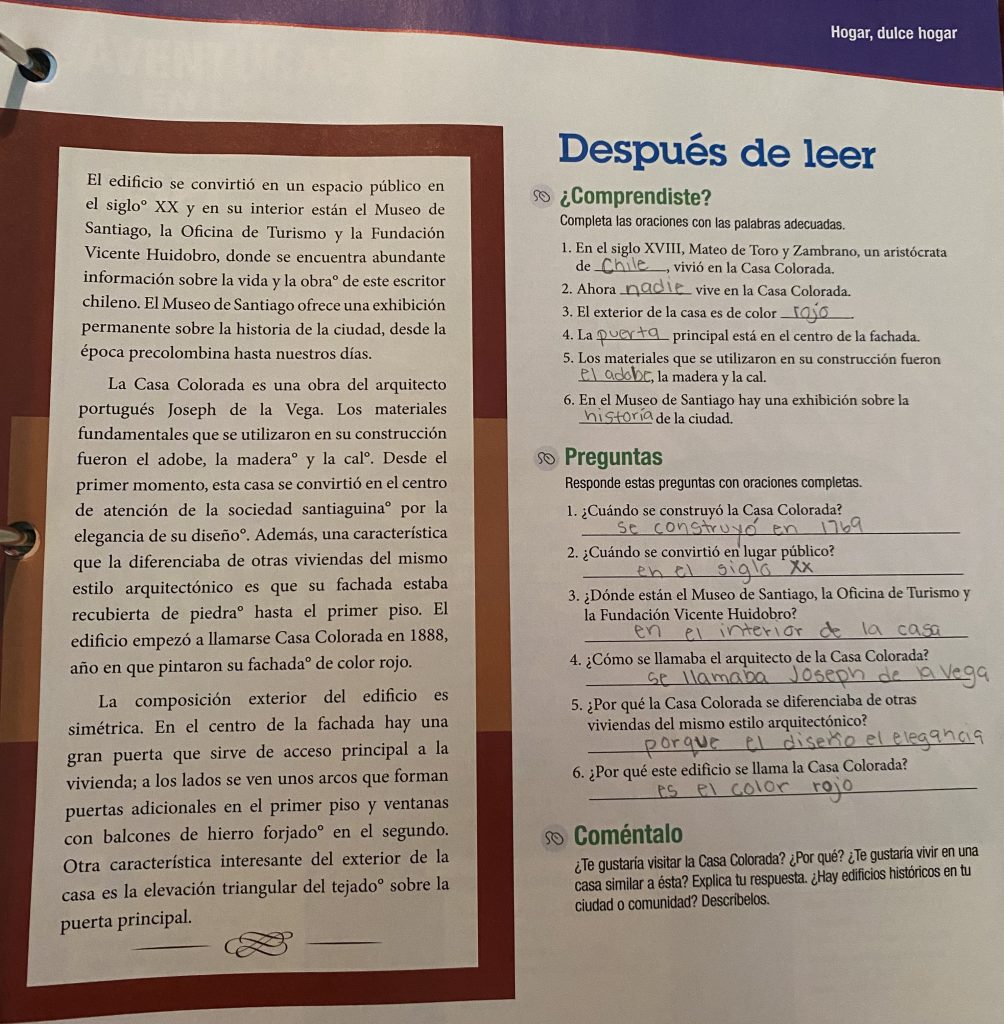Exploring Culture
Throughout this course, I have seen my interest in Latin American culture increase. I also have learned a lot through the readings, videos, and the Talk Abroad activities. While the reading and videos were sometimes based on a cultural topic, the Talk Abroad activities gave me a chance to listen and learn about a Spanish speaker and their own lives. Both benefitted me in a huge way, giving me insight to some of the culture that is behind the studied language.
Some of the videos and reading assignments taught me societal or cultural norms for Spanish speaking countries or households. I was intrigued by the different activities, traditions, places, and things in the videos or stories. Being able to learn some about the culture keeps me interested and inspired to learn more. Being taught about the culture and society, seeing it portrayed in videos, and reading about the history draws me to the language, the countries, and the people more. After this course and other Spanish classes that I have taken in the past, I feel more inclined to learn and explore culture on my own; however, none of this is new to me or exhibits a change in worldview. I already was intrigued by international culture; hence, I take Spanish classes, putting me somewhere to learn and explore some of that culture. Through the Talk Abroad, reading, and listening assignments that this course included, I have been given the opportunity to explore the culture of Spanish-speaking countries.
Example: Talk Abroad #2 audio
Engaging in Communities
My high school experience taught me that it is important to engage in the community and people around you because it is the only way to preserve culture and good conditions of living. To ensure that a community as a whole is happy, healthy, and prosperous, the members of it must break down the walls between themselves and create bonds. It is necessary to engage in your community service projects, fundraising events, promotions, or anything else that comes to mind because meaningful and honest bonds are made. With these bonds, a better support system and understanding of each other is created, making it possible for societal, economic, or political issues to be resolved.
Reflection: In regards to my Spanish experience, I believe that learning Spanish has opened me up to a wider variety of cultures. With Spanish, I am able to bridge the language gap between other cultures and I. By breaking down the language barrier between global communities, I can start getting involved in those communities, building bonds, and creating a beneficial relationship between our two cultures. By being engaged in foreign communities, I have become more open to global issues and how other countries’ lifestyles are comparable. In my Talk Abroad, I show this by discussing, not only Argentina’s CO-VID related issues, but also my Australian teammate’s obstacles regarding the disease. Being in touch with a variety of foreign people and internationally-based courses have allowed me to ask questions, learn, and engage in those conversations.
Example: Talk Abroad #2 Audio
Interpersonal Communication
Talk Abroad was one of the most interesting and beneficial things that we did in the course. We got to speak face-to-face to native Spanish-speakers in a non-stressful, learning environment. The focus was not necessarily on the right or wrong answers, and more on how well you could understand and communicate. I felt that Talk Abroad and other speaking actives were focused on learning and working our way through speech.
Reflection: The discussion boards, breakout rooms, and speaking interviews gave me the opportunity to slow down and ensure that I replied with good grammar and technique. This helped me learn concepts and apply them easier. However, I believe that I have grown most as a speaker because of the Talk Abroad assignments. Class discussions are different in the way that I have time to prepare myself. Over Zoom, I decided when I was ready to talk, often giving myself plenty of time to think and create the right response; however, over a video call with someone who may not even know English, I did not have that luxury.
I think that the Talk Abroad conversations helped me because I was able to relax and just talk to the person, knowing that I was in a non-judgmental and friendly environment. I know the class has that same environment, but it still is nerve-wracking. Without being able to prepare beyond what is provided in the conversation’s title, I was required to comprehend and reply to whatever my partner said, whether it related to the prompt or not. This was difficult but helped merge the things I learned with real-time conversation. I think that I did well with it though, as I was able to adapt to the conversation and keep it going. However, sometimes I would know what I want to say and be able to say all of it except one or two simple words. So, maybe next time I should use descriptions to fill in that hole. I could also give myself s little more time to plan out what I am going to say, instead of just replying automatically. This way, I do not get to the end of my sentence and not know what word I am trying to say.
Example: Talk Abroad #1 Audio
Presentational Speaking
Besides answering aloud in class, we did not do much presentational speaking. Most activities we did were communicative. Sometimes, we were put in breakout rooms to work on classwork with a partner. Also, our exam was sort of in a presentational speaking format.
Reflection: When it comes to presentational speaking, I feel like my brain gets ahead of my mouth. I know what I want to say, I think I know how to say it, and then I get stuck on a word. Also, I sometimes start rambling in Spanish, just trying to keep the conversation going; because of this, I sometimes feel that I did not get to showcase my knowledge of what we actually learned. I assume it has to do with nerves. From now on, I need to settle down, not overthink my answers, and instead think about what the chapter and exam is supposed to be on. This way, I can allow my strengths of improvising and keeping a Spanish conversation going work together with my knowledge. I think if I focus on the grammar that I am being taught and some learning targets before answering the question, then I can phrase my answer in a way that accomplishes everything; my response will not only answer the question and keep the conversation going, but it will also demonstrate what I have learned. Although it was not necessarily “presentational speaking”, my Talk Abroad exemplified my
Presentational Writing
Throughout the course we had lots of opportunities for written presentational communication. We did a few discussion forums in which we responded to a question and two other classmates. Also, we had homework sections that required us to write a brief paragraph. Lastly, we had composition prompts that required detail and description.
Example: Discussion Board #4 on Blackboard
Discussion-BoardReflection: Coming into this course, I had prior knowledge of some of the stuff we learned; however, I did not have practice putting it all together. In my compositions and discussion posts this year, I was able to connect a lot of what I learned in one post while still making sense. Specifically, I think that my verb usage and the flow from one tense to another is a lot better. I think that the multitude of videos that we were assigned showcased the real-life situations of what we were learning. Watching/listening and recognizing the way it should or would sound in real situations helped me apply what I was learning coherently. On the other hand, I noticed that I could be more consistently correct when using the pronouns or “para” and “por”. I have not completely mastered the little grammar details, so I need to practice more.
Interpretive Listening
In several homework assignments, we have assignments of interpretive listening. Audio files of conversations tested our knowledge of the fundamentals of speaking and grammar. On the other hand, videos with lots of details and questions that focused on the plot rather than grammar, requiring us to connect what we learned to a whole skit.
Reflection: Audio recordings were often easy to understand and answer the questions right. Most audio homework was focused on the grammar or vocabulary. After first learning something and still needing to hear examples of it, these assignments did help bridge the gap between textbook work and conversation. Furthermore, the videos added detail and plot, which made things a bit more difficult. While slowly following along with everything that I was still trying to get the hang of, an abundance of other things were now distracting me. Oftentimes, I would need to replay skit, but I got through it. I believe that replaying the videos exposed me to a lot of realistic, conversational use of what I’m learning. Now, I believe that my listening comprehension and writing has improved and become more reflective of what I am learning. My biggest takeaway would be that my Spanish improvement could directly reflect the amount that I expose myself to it. I find it interesting that, even though I can’t understand it easily at first, hearing Spanish more regularly still benefits me greatly.
Example: Video skit and questions
Interpretive Reading
In Spanish 201, we read short passages from our book with the purpose of identifying and understanding small details. We were challenged to understand and remember small details, just as we should be able to do with any book or movie that is in English. The assignment questions oftentimes left room for inference and interpretation as well, keeping students from depending on a word-for-word answer in the text.
Example: Lecture, “La Casa Colorada” on page 324, Aventuras Fifth Edition
Reflection: I believe that I have gotten a lot stronger in the category of interpretive reading. I used to take a short-cut of reading the questions first and then reading the passage to sort of search for the corresponding answers. Now, with our homework being online, I had no choice but to read first and then answer. At first, in order to fully understand and retain the information, I needed to repeat the video clips or paragraphs multiple times. Over time though, I was able to retain and understand the context of a video or reading in a more detailed way. I think it is interesting how easy it is for us to do such things during a movie or while reading a book versus how hard it can be in another language. I think it has to do with the unexpected amount of concentration it takes. So, I think my best advice to myself based on this course’s assignments would be to actively listen and read. Sometimes translating in my head or annotating helped me stay up to speed with small details. No matter what strategy, I need to be an active reader, so one piece of misunderstood information does not turn in to a whole re-read of the passage.


